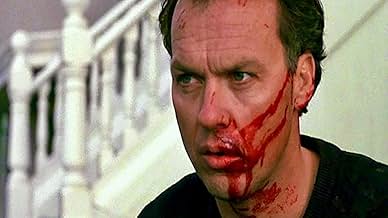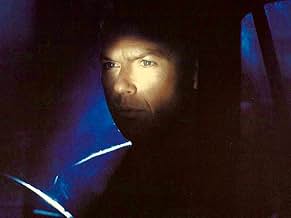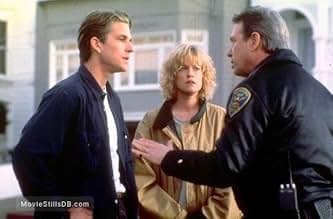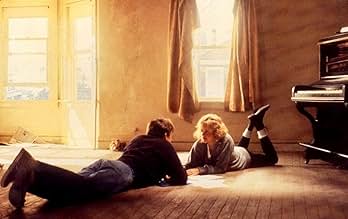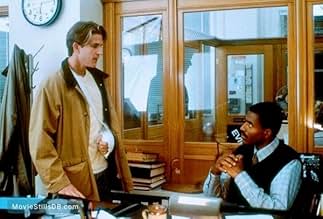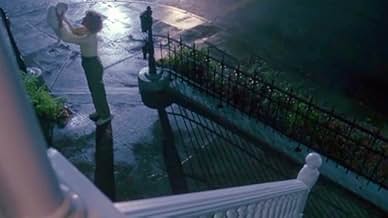AVALIAÇÃO DA IMDb
6,4/10
24 mil
SUA AVALIAÇÃO
Um casal trabalha duro para reformar a casa dos seus sonhos e se tornam senhorios para pagar por ela. Infelizmente, um de seus inquilinos tem planos próprios.Um casal trabalha duro para reformar a casa dos seus sonhos e se tornam senhorios para pagar por ela. Infelizmente, um de seus inquilinos tem planos próprios.Um casal trabalha duro para reformar a casa dos seus sonhos e se tornam senhorios para pagar por ela. Infelizmente, um de seus inquilinos tem planos próprios.
Avaliações em destaque
An unusual choice for Michael Keaton to follow up his first "Batman" movie with him going from hero and to outright villain.
Plot In A Paragraph: Drake Goodman (Modine) and Patty Palmer (Griffith)an unmarried couple, purchase an expensive 19th-century house in the exclusive Pacific Heights neighbourhood. They rent one of the building's two first-floor apartments to the Watanabes, a kindly Japanese couple. Not long after, Carter Hayes (Keaton) visits to view the remaining vacant unit and immediately expresses a desire to move in. Hayes drives an expensive Porsche and carries large amounts of cash on him. He convinces Drake to waive the credit check in exchange for a list of personal references and an upfront payment of the first six months' rent, to be paid by wire transfer. Before any of that happens he moves in unannounced and refuses to leave.
Melanie Griffith whilst looking great is awful acting wise, and Matthew Modine had me questioning how this man forged a career as an actor. Some of my main annoyances came from his character, and I had my concerns that he may end up being the real psycho, but his performance really was dire.
It's Keaton as the villain of the piece, who shines and gives the movie it's best scenes. Tippi Hedren and Dan Hedaya have small roles and Beverley D'Angelo has an uncredited role as a former lover/business partner of Carter's. I'm not sure why she is uncredited though.
Plot In A Paragraph: Drake Goodman (Modine) and Patty Palmer (Griffith)an unmarried couple, purchase an expensive 19th-century house in the exclusive Pacific Heights neighbourhood. They rent one of the building's two first-floor apartments to the Watanabes, a kindly Japanese couple. Not long after, Carter Hayes (Keaton) visits to view the remaining vacant unit and immediately expresses a desire to move in. Hayes drives an expensive Porsche and carries large amounts of cash on him. He convinces Drake to waive the credit check in exchange for a list of personal references and an upfront payment of the first six months' rent, to be paid by wire transfer. Before any of that happens he moves in unannounced and refuses to leave.
Melanie Griffith whilst looking great is awful acting wise, and Matthew Modine had me questioning how this man forged a career as an actor. Some of my main annoyances came from his character, and I had my concerns that he may end up being the real psycho, but his performance really was dire.
It's Keaton as the villain of the piece, who shines and gives the movie it's best scenes. Tippi Hedren and Dan Hedaya have small roles and Beverley D'Angelo has an uncredited role as a former lover/business partner of Carter's. I'm not sure why she is uncredited though.
This film didn't completely win me over like I was hoping it would, but some solid acting, a good premise, and a few clever scenes made it worthwhile. There was never anything particularly suspenseful about the film, and you pretty much know who will win by the end, but the loathesome Michael Keaton character helped to keep me interested throughout. There were also a few things that especially annoyed me, including the terminally stupid Matthew Modine character, but this movie just has too many positives for me to dwell on the negatives. It's by no means perfect, but it's an effective thriller nonetheless.
This movie begins with a man named "Carter Hays" (Michael Keaton) in bed with a woman when suddenly the door bursts open and two men enter and proceed to beat him with a baseball bat. The film then shifts to a man by the name of "Drake Goodman" (Matthew Modine) and his girlfriend "Patty Parker" (Melanie Griffith) buying a large Victorian house with the intent on renting some of the rooms out in order to help pay off their sizeable mortgage. Unfortunately, one of the first people to apply for a rent is Carter who convinces Drake to forgo the usual procedures and disregard the normal paperwork. Big mistake--as from that point on Drake's life quickly spirals out-of-control due to Carter's evil manipulations. Now rather than reveal any more I will just say that this is the type of film that is was an interesting movie for the most part which included a good performance by Michael Keaton as the dark and sinister villain. On the other hand, the repeated violent outbursts of Drake got a bit old after the first time or two and ruined any sympathy I might have had for him. Even so, although this isn't a film that I would want to see more than once or twice, it was good enough for the time spent and I have rated it accordingly. Slightly above average.
I saw this movie again recently, and I have to say that upon reconsideration I think this film is a bit underrated. There are a few deeper sociological issues being explored here that I perceive but are quite subtle in their appearance in the film.
It is a study about the law to some degree, and it has some critical things to say about the ability for one who knows the law and its loopholes and thus exploits others with tools that were originally intended to preserve civil society. Keaton plays a psycho, but one who is highly educated and quite adept at his craft of fraud and deceit.
Further, Modine's character is irrational, befuddled, and ultimately marginalized. I wonder if the director took some liberties with him (as this is a true story, I don't know everything about the real person he portrays) to bring out a few of his close-minded tendencies that may have contributed to the awful situation in which he finds himself. Obviously, there is the closet racism which keeps him from renting to a black man (this is thrown in the viewer's face later and is quite obvious), but there is also the way he perceives a man's role as the solver of problems and his wife as nothing more than a spectator.
That she ends up being the one to calmly and coolly affect a search for and investigate Keaton's character, assaults the traditional notions of a man's role as a protector. Her temperament is ultimately more appropriate for the solution to the problem, and I think it is no accident that the director portrays it in this way.
It is a study about the law to some degree, and it has some critical things to say about the ability for one who knows the law and its loopholes and thus exploits others with tools that were originally intended to preserve civil society. Keaton plays a psycho, but one who is highly educated and quite adept at his craft of fraud and deceit.
Further, Modine's character is irrational, befuddled, and ultimately marginalized. I wonder if the director took some liberties with him (as this is a true story, I don't know everything about the real person he portrays) to bring out a few of his close-minded tendencies that may have contributed to the awful situation in which he finds himself. Obviously, there is the closet racism which keeps him from renting to a black man (this is thrown in the viewer's face later and is quite obvious), but there is also the way he perceives a man's role as the solver of problems and his wife as nothing more than a spectator.
That she ends up being the one to calmly and coolly affect a search for and investigate Keaton's character, assaults the traditional notions of a man's role as a protector. Her temperament is ultimately more appropriate for the solution to the problem, and I think it is no accident that the director portrays it in this way.
Sometimes art imitates life and truth is stranger than fiction. I say that because last year four homeless women in Oakland, California squatted in a vacant house and refused to leave. They called themselves Moms4Housing and they made a mini-movement out of their theft. Instead of being summarily evicted from the house, the matter had to go to court. Their claim was that housing is a human right and since this home was vacant they had a right to it. The whole ordeal took about five months or so to be settled with the court ruling in favor of the company that owned the home. In this case, the owner of the home was a business that could afford to go to court and wasn't pressed for an immediate need of the house.
Which brings us to "Pacific Heights." A man by the name of Carson Hayes (Michael Keaton) simply moved into a vacant unit in a Victorian home in San Francisco without paying money and without permission. Due to the tenant-favoring laws, Drake (Matthew Modine) and Patty (Melanie Griffith) could not simply kick Carson out. They had to go through a lengthy and costly process to remove him which cost them all their savings and nearly their lives.
Carson wasn't a rent paying tenant whose rent just got jacked up by 50%, nor was he a rent paying tenant that was being evicted for some arbitrary reason, he was a slick con man that found a loophole in the system that protected his conniving con.
This was a tense movie in which you hoped to learn what Carson's motives were and what was his end game. The onion was peeled back a little, but I was never really satisfied with the explanation.
Michael Keaton was strong as the antagonist. This was back when he was crushing it on screen with movies like "BeetleJuice" and "Batman." Matthew Modine and Melanie Griffith were weak castings. I must admit, I think Melanie is a weak casting in anything, but she was an especially weak casting in this movie.
The story itself and the pacing was good. I liked it as a suspense thriller, but whatever the intent of the writer was, I don't think the cities in the S.F. Bay Area heard him.
Which brings us to "Pacific Heights." A man by the name of Carson Hayes (Michael Keaton) simply moved into a vacant unit in a Victorian home in San Francisco without paying money and without permission. Due to the tenant-favoring laws, Drake (Matthew Modine) and Patty (Melanie Griffith) could not simply kick Carson out. They had to go through a lengthy and costly process to remove him which cost them all their savings and nearly their lives.
Carson wasn't a rent paying tenant whose rent just got jacked up by 50%, nor was he a rent paying tenant that was being evicted for some arbitrary reason, he was a slick con man that found a loophole in the system that protected his conniving con.
This was a tense movie in which you hoped to learn what Carson's motives were and what was his end game. The onion was peeled back a little, but I was never really satisfied with the explanation.
Michael Keaton was strong as the antagonist. This was back when he was crushing it on screen with movies like "BeetleJuice" and "Batman." Matthew Modine and Melanie Griffith were weak castings. I must admit, I think Melanie is a weak casting in anything, but she was an especially weak casting in this movie.
The story itself and the pacing was good. I liked it as a suspense thriller, but whatever the intent of the writer was, I don't think the cities in the S.F. Bay Area heard him.
Você sabia?
- CuriosidadesScreenwriter Daniel Pyne once rented an apartment to a tenant that he could not evict. The film was inspired by this scenario.
- Erros de gravaçãoThe policeman quotes an entirely non-factual law to Drake about a tenant having rights just because a tenant physically enters a building, even at the time the movie was made. No tenant has any legal right to remain on the premises of a single-family or multiple-family dwelling in any state without payment, and furthermore, because of Carter Hayes destructive acts (e.g., releasing the cockroaches and physical damage to the unit), Drake had more than enough good cause to have Carter forcibly evicted, either by the City of San Francisco police or the San Francisco County sheriff.
- Citações
Amy: Patty?
Patty Palmer: Yeah?
Amy: Do you mind if I ask you why you're selling? I mean, you've done so much to this place. You've obviously put your heart in it.
Patty Palmer: [Ironically] No, not really. It was just an investment.
- Cenas durante ou pós-créditosMelanie Griffith's character Patty Palmer is credited as Patty Parker in the credits.
- ConexõesEdited into The Green Fog (2017)
- Trilhas sonorasVivaldi: Summer - The Four Seasons
Music by Antonio Vivaldi (uncredited)
Performed by Pinchas Zukerman (as Pinchas Zuckerman) and Israel Philharmonic Orchestra (as The Israeli Philharmonic)
Courtesy of Deutsche Gramaphon, a division of PolyGram Classics, Inc.
Principais escolhas
Faça login para avaliar e ver a lista de recomendações personalizadas
Detalhes
- Data de lançamento
- País de origem
- Idiomas
- Também conhecido como
- De repente, un extraño
- Locações de filme
- Potrero Hill, San Francisco, Califórnia, EUA(1243 19th St, San Francisco, CA 94107)
- Empresa de produção
- Consulte mais créditos da empresa na IMDbPro
Bilheteria
- Orçamento
- US$ 18.000.000 (estimativa)
- Faturamento bruto nos EUA e Canadá
- US$ 29.381.956
- Fim de semana de estreia nos EUA e Canadá
- US$ 6.912.637
- 30 de set. de 1990
- Faturamento bruto mundial
- US$ 44.926.706
- Tempo de duração
- 1 h 42 min(102 min)
- Cor
- Mixagem de som
- Proporção
- 1.85 : 1
Contribua para esta página
Sugerir uma alteração ou adicionar conteúdo ausente


